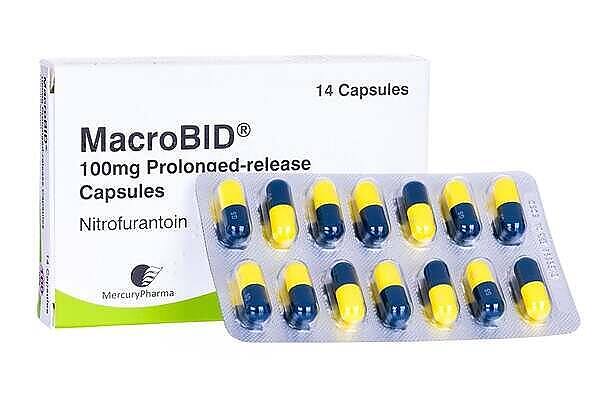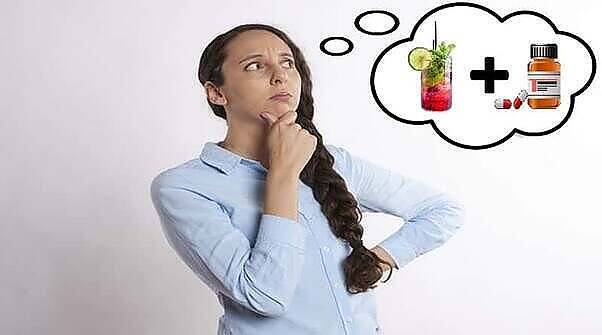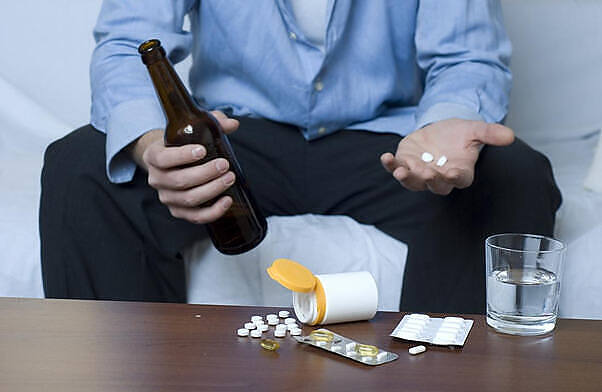We all get unwell from time to time, sometimes needing a little help recovering with antibiotics. Macrobid is a commonly prescribed antibiotic medication used for the treatment of urinary tract infections and bladder infections.
If you are currently prescribed Macrobid, you may be wondering if it is safe to drink alcohol whilst taking your medication, and if so, how much alcohol is safe without it hindering your recovery.
Each year, in the UK, millions of prescriptions are issued for the treatment of bacterial infections, but not all antibiotics are safe to mix with alcohol.
Here, Detox Plus UK looks at the effects of Macrobid and alcohol, how drinking whilst on Macrobid may make you feel, as well as the associated possible risks and complications.
What is Macrobid?

Macrobid is a common generic brand name for the antibiotic nitrofurantoin monohydrate.
Consuming large quantities of nitrofurantoin and alcohol should be avoided as it will likely delay your improvement.
Macrobid is a prescription antibiotic medication that treats urinary tract and bladder infections by reducing the growth of bacteria. It is unsuitable for treating bacterial infections outside of the bladder, i.e., kidney infections. And will not work in treating viruses.
What Are the Side Effects of Macrobid?
Common side effects include:
- nausea,
- vomiting,
- upset stomach,
- diarrhoea,
- rust-coloured or brownish urine,
- vaginal itching or discharge,
- headaches,
- gas.
Avoiding alcohol whilst taking Macrobid and taking the medication with or straight after food will help to reduce these sometimes troubling symptoms.
Other brand names for Nitrofurantoin are Aratoin, Macrodantin and Furdantin.
The medication is usually prescribed orally in tablet form but is also available in capsules and a liquid that you can drink.
Macrobid is not suitable for everyone; it is, therefore, wise to discuss any concerns you may have with your doctor – before commencing to take the medication.
Before taking Macrobid, please tell your consultant:
- If you have ever had an allergic reaction
- Any medications you are taking, including over-the-counter medications
- You are diabetic
- If you suffer from liver or renal problems
- If you are pregnant or breastfeeding
- If you suffer from an alcohol use disorder or drug problem
Not disclosing the above information could result in you becoming seriously unwell.
Can you drink on Macrobid?
If you are currently prescribed Macrobid, you may be wondering if it is safe to drink alcohol whilst taking your medication, and if so, how much alcohol is safe without it hindering your recovery.

When alcohol is consumed, the body produces an acetaldehyde toxin (a byproduct formed during the breaking down process). This is very relevant as acetaldehyde can cause digestive problems. Acetaldehyde can also cause you to feel sick or vomit. Drinking alcohol will only increase the side effects of nausea, stomach pain and diarrhoea.
Alcohol also causes the body to become dehydrated as it acts as a diuretic; this can also contribute to feelings of nausea and suffering other unpleasant symptoms such as headaches, lethargy and dizziness.
For a quick recovery, follow these recommendations:
- See your specialist as soon as possible for a correct diagnosis and prescription
- Take the full course of your medication directly as prescribed
- Stay well hydrated and drink plenty of water
- Avoid caffeine, alcohol and anything else that acts as a diuretic
- Eat well; if you feel sick, eat little and often
- Avoid spicy food and citrus fruits
- Increase your intake of vitamin C with a supplement
- Drink cranberry juice
- Take your medication with or straight after food
- Report any worrying or troublesome side effects
- Tell your doctor if your condition does not start to improve after a few days of taking Macrobid
- Get plenty of rest and avoid any physical activity that induces sweating
- To reduce pain and inflammation, paracetamol and ibuprofen can be taken with Macrobid
How much alcohol is considered safe?
Macrobid possesses some common side effects that are exaggerated by drinking alcohol. The more alcohol you consume, the worse these side effects will be and the longer it will take to recover from your illness.
Some people are naturally more sensitive to the side effects than others. If you are pregnant, breastfeeding, have liver problems, diabetes, or suffer renal impairment, indications are that you should avoid alcohol altogether whilst taking a course.
There is no definitive answer in terms of how much alcohol is safe with Macrobid, as this will vary from person to person.
Generally speaking, provided you tolerate Macrobid well and do not have any additional underlying health conditions, it is safe to drink small amounts of alcohol.
When we say small amounts, two to three drinks daily maximum, with a day’s break in between, this enables your body to process and flush out alcohol’s toxins adequately.
The effects of mixing Macrobid and alcohol
The main negative effect of drinking alcohol whilst taking Macrobid is that alcohol causes dehydration. To effectively recover from a urinary tract infection or bladder infection, you must stay well hydrated!
Consuming alcohol whilst suffering from a bladder infection may also make it more painful to urinate. Alcohol has diuretic effects, causing your urine to become more concentrated, making the presence of bacteria more known when you try to pass water.
As with all antibiotics, Macrobid may also upset the balance of good bacteria in your gut; drinking alcohol will only increase the effects.
The health of our gut also directly impacts our mood, making gastrointestinal problems more likely to cause anxiety, low mood, irritability and mood swings.
Even after finishing the course, restoring your good gut bacteria balance can take some time (and dietary assistance).
Drinking alcohol straight after you have finished your course of Macrobid can cause a delay in the healing process of good bacteria in your gastrointestinal tract.
Mixing Macrobid and alcohol may cause the following unpleasant side effects:
- Anxiety
- Low mood
- Headache
- Dizziness
- Dehydration
- Bloating
- Flatulence
- Stomach pain
- Abdominal pain
- Constipation or diarrhoea
- Nausea
- Tiredness
- Vomiting
- Increased pain on urinating
- Increased pain in the bladder and urinary tract
- Increased risk of liver problems
- Increased risk of bruising easily
Will alcohol stop Macrobid from working?
There is no research to suggest that alcohol will stop Macrobid from working. It will continue to work as it should, even if you do consume alcohol. However, this does not mean mixing is a good idea, or you won’t experience any side effects.
Alcohol negatively impacts the body’s immune system for at least 24 hours post-consumption. This can adversely affect the timeline it takes you to recover from your infection, even with the assistance of antibiotics.
As a result of Macrobid and alcohol consumption, your body’s natural immune system will be less effective at fighting bacteria.
Despite Macrobid continuing to be effective when alcohol is consumed, the impact of alcohol on impairing your immune system should not be underestimated nor disregarded.
If not treated quickly and effectively, a bacterial infection can have serious complications. Anything that hinders the effectiveness of your immune response, especially when fighting an illness, should ideally be completely avoided until you fully recover.
The other thing to consider is that your body’s ability to absorb nutrients, stay hydrated and get proper rest will also be disrupted. These things are essential to recovering from any illness. The more alcohol you consume, the more disrupted the process of recovery becomes.
Taking Macrobid when you have an alcohol problem
Generally speaking, whilst taking any antibiotics, it is best to avoid alcohol completely for the duration of your treatment. This will give you the best chance of full and speedy rehabilitation and reduce the severity of any side effects.
If you have an alcohol problem but need to take Macrobid, please ensure that your consultant is fully aware and keeps a close eye on your symptoms. This is especially important if you are alcohol dependent or have suffered alcohol-related damage to your organs.
If you are alcohol dependent, it will not be safe for you to suddenly stop drinking so that you can take a course of antibiotics. Abrupt cessation of alcohol where an alcohol dependence is identified can result in acute alcohol withdrawal symptoms and a worsening of your bacterial infection.
If you want help to stop alcohol safely and quit alcohol for good, please call Detox Plus UK to discuss your treatment options. We are here to listen and help, providing you with the best addiction treatment and care.
References and sources –
- The haematological complications of alcoholism. Ballard HS. (1997). The Hematological Complications of Alcoholism
- Side effects of Macrobid (Nitrofurantoin), Warnings, Uses
- Alcohol and the immune system
- Can I drink alcohol whilst taking antibiotics
- https://www.nps.org.au/australian-prescriber/articles/nitrofurantoin-and-fosfomycin-for-resistant-urinary-tract-infections-old-drugs-for-emerging-problems
- Effect of Increased Daily Water Intake in Premenopausal Women With Recurrent Urinary Tract Infections: A Randomized Clinical Trial.
- Consumption of a cranberry juice beverage lowered the number of clinical urinary tract infection episodes in women with a recent history of urinary tract infection.



